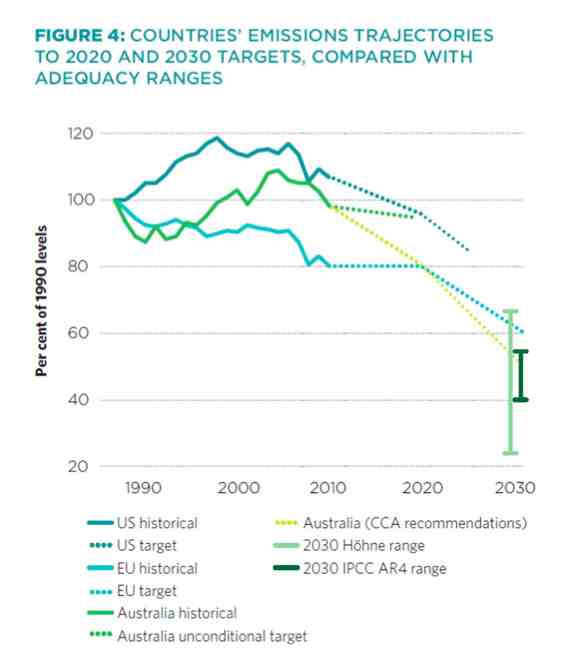So, what does the fossil fuel industry and the Australian government have in common? Quite a lot as it turns out.
Both mouth platitudes about the importance of addressing climate change, and both are betting their economic futures on a scenario where the world does little about it. Both are determined to extract every last molecule and tonne of gas, oil and coal that they possibly can.
That much is clear – if it wasn’t already – by the tenor of the Abbott government’s options paper on its post 2020 emission reduction targets.
Despite some glamorous press coverage claiming that Prime Minister Tony Abbott is now taking climate change seriously – Fairfax Media on the weekend claimed that Prime Minister Tony Abbott is “a leader committed to the next big global climate commitments” – the options paper is a parody of any such idea.
There is no talk of meeting a 2°C target, the goal that Australia signed up to way back in Copenhagen. And the government insists that its primary policy will remain Direct Action, and continued government handouts to big business – a scenario that analysts say will cost it tens of billions in annual payments.
The energy scenario canvassed by Australia is almost exactly the same as BP, other big oil internationals, and Big Coal: that fossil fuels will remain dominant in the decades to come.
“At present, around 80 per cent of the world’s primary energy needs are met through carbon-based fuels. By 2040, it is estimated that 74 per cent will still be met by carbon-based sources because of growing demand in emerging economies,” the report says.
As the paper itself points out, this is the “New Policies” scenario painted by the International Energy Agency. This is where global warming reaches 4°C, creating environmental and economic consequences that can barely be imagined.
In the words of the IEA, it would be a disaster. “Remarkably, if we were to continue on this path, the world’s energy supply would hardly be any cleaner in 2030 than it was at the founding of the IEA in the early 1970s,” the IEA noted with despair last year.
The IEA says that if the world wanted to meet its 2°C target, it needed to recognise that is had nearly exhausted its allowable budget of fossil fuels and must focus on electricity decarbonisation and immediately accelerate investment in low-carbon technologies.
Little wonder that Australia did not mention 2°C. This is the opposite of the Abbott government’s message, which wants to embrace business as usual, or even worse than BAU, as it flagged in the latest details to its emissions reduction fund last week, offering yet another free kick to polluters.
And remember, this document was not prepared by the environment department, or the foreign affairs department which has carriage over international climate talks. It was prepared by the PM’s office, which has seconded the issue as it did the renewable energy target, which has virtually killed the renewables industry in Australia.
The Australian rhetoric is also in stark contrast to what other countries are signing up for. Mexico became the first developing country earlier this month to sign up for binding targets.
As the White House noted: “Mexico is setting an example for the rest of the world by submitting an INDC that is timely, clear, ambitious, and supported by robust, unconditional policy commitments. In particular, Mexico’s target to peak its emissions by 2026 and drive them down thereafter is a landmark step in the global transition to a low-carbon economy.”
The EU said in its submission: Our vision is of the Energy Union as a sustainable, low-carbon and climate-friendly economy that is designed to last … to reach our goal, we have to move away from an economy driven by fossil fuels, an economy where energy is based on a centralised, supply-side approach and which relies on old technologies and outdated business models.”
So if the Abbott government cannot even get its rhetoric on the same page as other countries, what chance is there of it getting targets on the same page.
The Abbott government’s position is in stark contrast to the independent body it is trying to close down, the Climate Change Authority, which last year said that Australia should aim for reduction of between a trajectory range for emissions reductions of between 40 and 60 per cent below 2000 levels by 2030 .
The Climate Institute says the target should be 40 per cent by 2025 and net zero emissions between 2040 and 2050.
The CCA in the past has ridiculed Australia’s current policy of cutting emissions from 2000 levels by 5 per cent, noting that without the Kyoto Protocol hangover, this amounts to a cut of just 1 per cent. It said Australia should much more reasonably use the Kyoto hangover to push its target to minus 19 per cent. It notes Direct Action will be unlikely to get to minus 5 per cent.
Like the IEA, the CCA also recommends a “carbon budget” of 10.1 billion tonnes of CO2 equivalent for the 37 years from 2013-2050. But even if Australia had a 45 per cent reduction target by 2030 – and met it – it would still virtually exhaust that budget by that time.
The CCA is to release an update of Australia’s post 2020 targets which in mid April. On Monday morning, it released a “guide” to help interpret the various pledges made by other countries. It highlights some of the problems about comparing the difference between various targets from different countries.
Here are some of the targets that have been announced so far. As the CCA notes, the base year is critical, because it can be used to make a target look more ambitious.
As this graph below signals, the 5 per cent reduction target can be diced in many ways. The Abbott government has been citing the reduction from 2005, choosing to compare the target with nearly the highest ever emissions. The CCA says the broad rule is that the earlier the base year, the earlier the action that country undertook. The EU, for instance, peaked before 1990.
Australia, the CCA argues, is not just one of the richest countries, with a high capacity to act, it also has the highest emissions per capita, bar Luxembourg. Even with a big decrease in per capita emissions in recent years, it is still much higher than other countries because its starting point was so bad.
- If Australia was serious about the 2°C target, then it would have to do something like that outlined below by the CCA. The vertical line on the right hand side is the range where countries have to get to if a joint effort is to meet that 2°C target. The fixed lines on the left are the historic achievements to date, and the dotted lines are where they are heading.
Europe, in light blue, gets within the top of the range. The US is getting closer. Not Australia, however, with its 5 per cent reduction target making barely any dent. The yellow dotted line is where the CCA says Australia needs to head.










